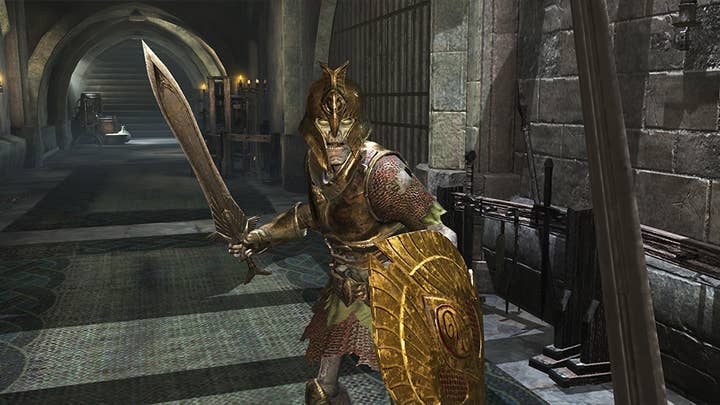E3 Roundtable: Microsoft's first-party intent, EA's loot box lament
Microsoft's flurry of studio acquisitions lit up E3's opening weekend, Bethesda showed every ace in its hand, and EA promised to do better
The opening weekend of E3 is over, and so too are three of the six biggest press briefings of the week.
Microsoft went into E3 at the centre of a discussion around the state of the Xbox first-party line-up, and the clear need to reassure its audience that PlayStation wasn't the only console with exclusive games of the very highest quality. Bethesda had already played two major cards by revealing Rage 2 and Fallout 76, leaving us all to wonder whether it had any big surprises left. And EA - well, EA had only to prove that there's more to its portfolio than Battlefield, sports and Star Wars.
How did they fare? Read on for the entirely subjective analysis of the GamesIndustry.biz team, and come back tomorrow for a round-up of E3 day two.
Brendan Sinclair
This is the best start to E3 I've seen in a while. Bethesda had everything a fan of the company could ever ask for (even if Starfield and The Elder Scrolls VI are not so much games as promises at this point). Microsoft managed to make its first-party lineup seem relevant again with five new first-party studios, Halo Infinite, and three new Gears of War games, including the utterly unwanted (but morbid curiosity-provoking) Gears Pop. Throw in a handful of big reveals for multiplatform third-party tiles -- Cyberpunk 2077, Devil May Cry 5, and Sekiro: Shadows Die Twice caught my interest -- and I'm now considering an Xbox One X purchase for more than just a 4K Blu-ray player and Netflix machine.
"I'm now considering an Xbox One X purchase for more than just a 4K Blu-ray player and Netflix machine"
EA was the weakest of what we've seen so far, but it did serve as a nice reminder that Respawn is working on a Star Wars game, and Unravel 2 looked fantastic. However, I don't think a surprise E3 launch for any game not on a portable system does anyone any favors. At least if it's a surprise launch on mobile or Switch, the assembled media and influencers in LA will likely be able to try it out immediately and generate some valuable buzz when the eyes of the world are still on them. I'll also say Anthem looks like an odd duck to me; the BioWare fanbase has come to expect a certain kind of experience and I don't see much of that at all in what we've seen so far
Finally, EA and Microsoft both jumped on the streaming bandwagon. Since we've already had functional streaming services come and go before, I wonder if they think those efforts lacked the right tech, the right business model, or both.
James Batchelor
We're probably going to look back on E3 2018 and remember it as one of the years that put us on the path towards a platform-agnostic industry. Certainly, that's the road EA, Xbox and Bethesda seem to be steering towards.
Both EA and Microsoft spoke vaguely but optimistically about the not-too-distant future where high-end games can be streamed to any device. Despite Phil Spencer's claims that development is well underway on the next Xbox, the Funko-styled Gears of War mobile game makes it clear the firm is keen to reach as broad an audience as possible - regardless of whether it's on a Microsoft device. Bethesda, too, seems to be preparing for this with two of its Elder Scrolls announcements. Progress carrying over from the mobile Elder Scrolls Legends to the console version is the simplest example of this, but Elder Scrolls: Blades is probably more indicative of what's to come.
"Bethesda is determined to tear down the walls between devices, as are the other two companies, as are EA and Microsoft"
A Skyrim-style experience distilled down to its core mechanics, controls that translate to any device, and plans to bring Blades to mobile, PC, consoles and VR form what could become a template for platform-agnostic games going forward. That mobile users can battle VR players (or indeed players on any platform) shows that Bethesda is determined to tear down the walls between devices, as are the other two companies.
The incredible success of Fortnite has proven that there's an appetite for a games experience you can take anywhere, and as EA CEO Andrew Wilson pointed out, the ability to enjoy your entertainment across multiple devices has already changed TV, film and books forever. This may be inevitable for games.
Of course, in this platform-agnostic future, the competition will be fought between services not separate systems. In this respect, all three conference hosts again laid their cards on the table: EA with its Origin Access Premier announcement, Microsoft with the ongoing push for Xbox Game Pass, and Bethesda with its subtle but frequent directions for viewers to sign up for an account at its website.
This will go hand-in-hand with the continuing shift towards longer-tail, games-as-a-service products, which were also very prominent this weekend. Fallout is now an online game planned for years to come, Anthem sees BioWare shifting aware from defined stories to continually unfolding ones, and while no details were given, it's a safe bet the Infinite in Halo Infinite refers to an ongoing and shared online experience.

Haydn Taylor
Microsoft has perhaps just made the first genuinely compelling argument to buy an Xbox since the console launched in 2013. Over the past five years, Microsoft has relied heavily on its multimedia strategy and a back-catalogue of more than decade-old franchises that get a little less exciting with each iteration, but E3 2018 has marked a notable change in pace.
Things looked like business as usual with the announcement of Halo Infinity which -- almost certainly -- intends to ape the success of Destiny. Of course, with Bethesda and EA also diving into those lucrative waters with Fallout 76 and Anthem, it seems unlikely every party will get a satisfying share of the persistent world shoot-and-loot market.
"EA took every opportunity to clarify the absence of lootbox mechanics in each of its new games"
The announcement of three new Gears of War games didn't do much to inspire confidence in Microsoft as a company that is genuinely trying to move forward, but the acquisition of both Ninja Theory and Playground Games did, along with the addition of Undead Labs and Compulsion Games to the Microsoft Game Studio roster. Ninja Theory alone is not only a studio of excellent pedigree, but also one with a fervent and loyal -- if not huge -- fan base, and it demonstrates Microsoft is more aware of its lacklustre exclusive line-up than the industry has previously given it credit for.
Meanwhile, From Software's new project appearing on the Xbox stage -- and being published by Activision -- is the last thing anyone expected. But it was just one of many little surprises Microsoft pulled from its bag of tricks, including the suitibly violent and highly anticipated Cyberpunk 2077 trailer, a new glimpse at Kingdom Hearts III, Metro Exodus, and even some Fallout 76 gameplay.
Coupled with the expanded offering of Xbox Game Pass, which now includes a host of third party games launching day-and-date, it's starting to feel as though Microsoft has finally remembered the Xbox One is a games console and is ready to deliver.
Finally, Electronic Arts, which has weathered a storm of consumer fury over the last year, was on damage control with its very paint-by-numbers conference. There was nothing much new on display, but loot boxes -- or lack thereof -- featured heavily, with the publisher taking every opportunity to clarify the absence of the mechanic in each of its new games. For a company that still ardently denies its loot boxes constitute gambling, it sounded an awful lot like the bosses at EA knew they can only do so much to counteract the legal definition as laid out by Belgium and the Netherlands in recent months.

Matthew Handrahan
There was plenty to enjoy in the opening salvo of E3 press briefings, the majority of which has been articulated by my colleagues. Behind each of these small victories, however, there was the acknowledgement of a mistake made and a lesson learned.
Nowhere was this more apparent than in EA's press conference. The company's focus on huge games operated as year-round services has earned its briefing the reputation of being E3's most relentlessly predictable. E3 2017 had the reveal of Bioware's Anthem, at least, but this year the biggest surprises were the bizarrely low-key announcement of Respawn's Star Wars title, the frequent references to its fumbled implementation of loot boxes, and the solemn pledge to never be so foolhardy again.
Bethesda's press conference was far more impressive, but it also seemed like a rebuke to its entire briefing from E3 2017. Last year, the company very pointedly focused only on products due to launch in the near future; by contrast, while some of the games on show yesterday will be in our hands before the end of 2018 (not least Fallout 76), Bethesda was unrestrained in teasing games not due for release until 2019 (and very likely beyond). After an uneven year in terms of commercial success it was a timely reminder of the strength of its portfolio, and the fact that Bethesda Game Studios now has a greater production capacity than ever before.
For me personally, though, the sense of atonement was most resonant in the Xbox briefing, where Microsoft produced its best showing in years to remind the world that it is still investing heavily in first-party development. The addition of five new studios to the Xbox family has been rightly praised, but it makes the closure of Lionhead (among other studios) all the more difficult to comprehend. Perhaps now Microsoft has a clearer idea of where it wants to be as a creator (and not just a publisher) of games. Perhaps now entire studios, their histories and their cultures will no longer slip between the cracks of its corporate strategy.

